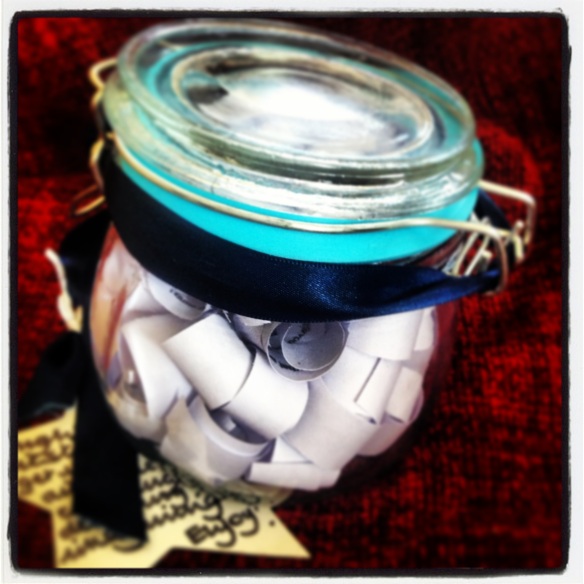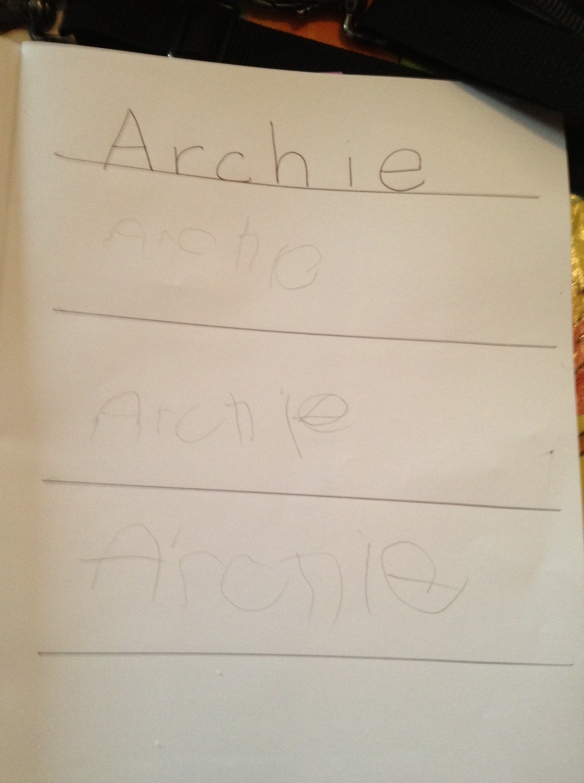
Joseph finished primary school this week. Come September he’ll be off to secondary school with 174 people in his year group – more than the total number of pupils in his current school. A time of change, and it has been a week of reflection. We have been lucky with the boys’ schools. Apart from a dodgy few terms when Archie was in mainstream (and to be fair that wasn’t entirely the school’s fault – Archie should never have been there) the boys’ have been in supportive schools who have done their best to help them reach their potential. In Archie’s case that potential seems to be expanding rapidly and I’m not quite sure where we’re going to end up.
Year 6 were given a warm send off. A close group of friends, there were tears when it came to say goodbye and a rather idyllic final barbecue overlooking the sea, with water fights, British bulldog and a swim in a sea pool. The children were given some lovely gifts including a jar of questions each from their class teacher. The note attached to the jar says that the questions are designed to get the children chatting and debating with their friends and family. They range from simple questions such as ‘what is your favourite place in the house?’ (Joseph: the computer room; Louis: the front room because I watch TV in there) to more abstract ones such as ‘if you could have any superpower in the world what would it be and why?’ I’ve put it on the kitchen table to encourage meal time conversation. It’s a thoughtful gift for any family. I thought Joseph might need to be a bit older to appreciate the value of such a gift but he was genuinely delighted and was keen to get started with the questions.
It’s a particularly useful present for our family because Archie often finds these sorts of questions difficult. Most of his conversation is concrete, usually about what he’s doing, or has done and when. I asked him earlier today what his favourite food was and he struggled to answer. Archie eat; Archie like food; eat food tomorrow were the initial answers before he said sweeties. Many of the questions in the jar are great for encouraging Archie to start to understand, think about and answer these more abstract questions, where he has to express a preference rather than provide an absolute right or wrong answer. He did well with ‘what is your favourite room in the house?’ and answered bathroom pretty quickly. He may not understand the concept of superpowers yet but he was included in the conversation and made his own contribution mummy car. A question about whether you would prefer to live on the moon or in the ocean led to a great debate between Joseph and Louis centring mainly on available food. I translated a little for Archie asking him which he preferred, the moon or the sea and he said sea which surprised me a little, maybe he recognises the effect the full moon has on him! Maybe he just wants to go surfing again, life has intervened and we haven’t been for a while.
While many of the questions may be a little out of reach for Archie at the moment, through being asked to contribute and through being part of the conversation I expect him to find them gradually easier to answer. Language cannot be learned passively, it is only through using language that you learn to wield it. These mealtime conversations provide an opportunity for Archie to take part in describing preferences and in debating without the attention being solely on him. He can hear other people being asked the same questions and listen to their answers. He can begin to understand that we are interested in his answers as well as his brothers’ and he can learn that questions aren’t always asked as part of an assessment and aren’t always designed to trip you up and reveal what you don’t know. It is a way in which we can show that we are assuming competence, something which Naoki writes about in The Reason I Jump. Incidentally, slightly off topic but this is a subject close to my heart and I co-authored a book chapter published this month on the issue of competence (Laughter and Competence: Children with Severe Autism Using Laughter to Joke and Tease in Studies of Laughter in Interaction).
Whilst I am aware that Archie doesn’t (yet) have the means to always express himself in a way that is easily understandable and that he sometimes needs help interpreting questions I can see the question jar becoming an important family tradition. I am already hatching a plan to get everyone to contribute new questions when we’ve worked our way through the originals. It is interesting for all of us to think about our answers and explain or defend them. To have Archie able to take part in this is wonderful. From expensive high tech talkers to simple jars of questions other people’s gifts are having a large impact on our lives.







